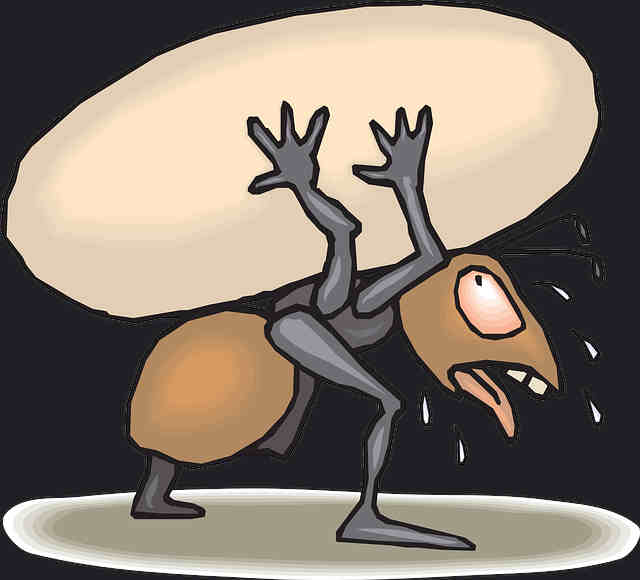Why do ants bite for no reason?
No reason you said! How Mother Nature wish it was for no reason!
I mean, after you (humans) relegated the big boys of the ant family to surgical sutures; the army ants and the leafcutting species, purloined their larvae and pupae to market them as expensive escamoles, and allowed workers of the black ant colony to bust their chops from collecting dispersed seeds of a herbal plant, only to raid their nests at dawn and rob them off their drudgery, why shouldn’t ants bite you, pull back, and then bite you all over again for the second time?

Nevertheless, ants are really patient and intelligent creatures and do not bite only for a reason. In fact, we could easily identify three reasons why some ant species will readily bite your arm whenever you place it on the ground.
1) Ants bite for defense
Like most members of the insect family, and even the wasp family that ants themselves have evolved from, most ants will only bite or sting you in response to something you did at the instant that they didn’t like. And at this point, I feel it’s pertinent to point out the difference between an ant’s bite and a sting, and then also a bite and a sting.
The third means for inflicting pain on annoying humans is chemical spray which I think we have to include into the explanation as well. (FYI, I’m a little ant trying to pass some message across).
What’s an ant’s bite: Both male and female ants bite with the aid of their mandibles; by pinching on the human skin to inflict pain around the area, ouch!
What’s an ant’s sting: Only female ants’ sting, and they do so using the caudal-most part of their bodies which is the pointy pin-like structure serving as an extension of their abdomen. When females sting, they usually inject venom into their victim for purposes such as subduing them, or warding them off with pain from proteins or other components in the venom.
Acid spray: Both male and female ants can spray, and in such cases, they usually do not sting. A spraying ant often sprays something called formic acid which cause an excruciating pain around the area they’ve scratched. For spray, the ant only needs to grab onto the skin, scratch (bite), and then spray acid onto the scratch to cause pain.
So now that we’re done with the brief preliminaries, what are the things that you might do that would make ants feel threatened.
- Walking right into their nests. Remember most ants have a queen to protect inside their nests, and not even something as giant as you are can make them back off from a fight.
- Obstructing their way with your legs and arms. This is the most common way we get bitten, especially outdoors while resting or even inside the house.
- Picking up a dad ant and body shaming it. No dad would ever want that to happen to them, especially when the aggressor is a child, regardless of whether it’s from different species! That’s why when you accidentally drop the ant on your body, you immediately get brash gift for testing some patience.
- Killing or crushing an ant when its colony is nearby. The crushed victim emits an alarm pheromone that is picked up by a nearby colony and then transitions them into an attack frenzy. This might not be a problem if you only accidentally crushed the ant while walking to a different destination, but when your sleeping or resting body actually did the job, then you’re in the soup! And when you’ll know is when the pinchers actually clip!
2) Ants bite to capture prey
Now, obviously, your hands look nothing like the prey of any millimeter sized predator, but that’s from your cramped perspective and not any ants’. These critters are actually go getters. Small but mighty, and that’s why they’ll seize up any opportunity for food whenever they can find one. It doesn’t matter whether it’s your arm or leg, so far it’s soft for their mandibles to seize, they’re in!
Now depending on the specie of ants delivering the bite or sting, the pain could be manageable or excruciatingly painful with serious side effects. If you’re on the latter boat, make sure to see a doctor with immediate effect.
3) Ants bite out of curiosity
Yes, ants are really curious creatures and that’s why sometimes, the very reason why an ant might be delving in for the bite might be because they were only being curious.
Was that food or was it wood?
Frequently Asked Questions
Do ants bite or sting?
Ants do both although not all ants can bite or sting, or do both. Female ants bite and sting whereas male ants only bite but do not sting. Ant bite using their mandibles, but clipping it together with the skin area in the middle, much like when you pinch your skin yourself. For stings, only female ants have the stinger which is located at the most caudal part of their body; their bottom. The first, often, bite to fasten themselves, then sting using their stingers which delivers venom sometimes capable of causing excruciating pain.
Additionally, some species of ants might not even bite or sting, but will rely on chemical spray as their weapon for catching prey, or defending themselves.
What does a fire ant bite look like?
The sting from a fire ant produces a round blister that is filled with pus. The blister typically resembles a pimple but it can have an intense pinching sensation behind it.
Why does ant bite itch?
An ant’s bite is typically a concoction of many different proteins and compounds. Each or groups of these compounds work together to produce different effects ranging from, redness, swelling, itchiness, nausea, dizziness, and the sensation of pain around the stung area.
Why do fire ants bite?
Fire ants bite typically in response to threat which could either be deliberate or unintentional.
How do ants bite?
Ants bite by pinching on your skin with their mandibles, scratching it in the process to create wound, and then spraying the wound with acid to cause pain around the area. When ant’s sting, they typically use their mandibles to hold onto your skin, then use their sharp stingers to pierce into your skin and deliver venom which can cause a variety of side effects ranging from swelling, nauseating, dizziness, to pain and even death in rare cases.
Do ants bite dogs?
Yes ants do bite dogs and the hotspots are their feet and their noses because these are the most exposed areas on a dog. The symptoms of ant bite on a dog could be lameness (if the sting is delivered to the feet), hives, licking on the affected area and swelling. In severe cases, the dog may suffer more serious side effects such as vomiting, collapse and pale gums. In this cases, the dog should be taken for medical treatment as soon as possible. Otherwise, a simple soothing salve of 50 percent baking soda and 50 percent water can be made at home and applied to the affected area on the dog, or for the more expensive approach, an over-the-counter Benadryl can be bought and applied to decrease the adverse effects of the venom.
What do carpenter ants bite look like?
Carpenter ant bites usually do not develop any serious side effects around or on the affected area. The spot may only be reddened by the venom and then itch mildly, but the sting is in itself harmless and all symptoms associated with it will subdue in a very short time.
Why do red ants bite?
Red ants bite in response to threat, to capture prey or out of curiosity when they come in contact with your body parts.
Do ant bite at night?
Yes, ants can bite at night just as they can bite in the day time too because most species found indoors are both active in the daytime as well as at night.
Do ants bite cats?
Yes ants can bite cats, and just like dogs, one of the most sensitive area is the feet. Most ant bites are completely harmless to cats, with the exception of fire ants which could cause serious side effects in some cases.
Can ants bite through cloth?
No, most ants don’t have strong mouthparts to be able to inflict bits to your skin through a cloth, although some of the army and leaf-cutting specie could due to their bigger head size.
Final Verdict
Ant, in spite of what our fairly boxed heads like to think, do not bite for no reason. When ants sting, they usually do so in response to threat which may or may not be deliberate. Ants can also bite you when they mistake your hands for prey or simply bite out of curiosity.
Whatever the circumstance, please don’t hate these beautiful species, because in the end, it’s only the truth i’m telling you; Ant’s do more good to the environment than harm!


